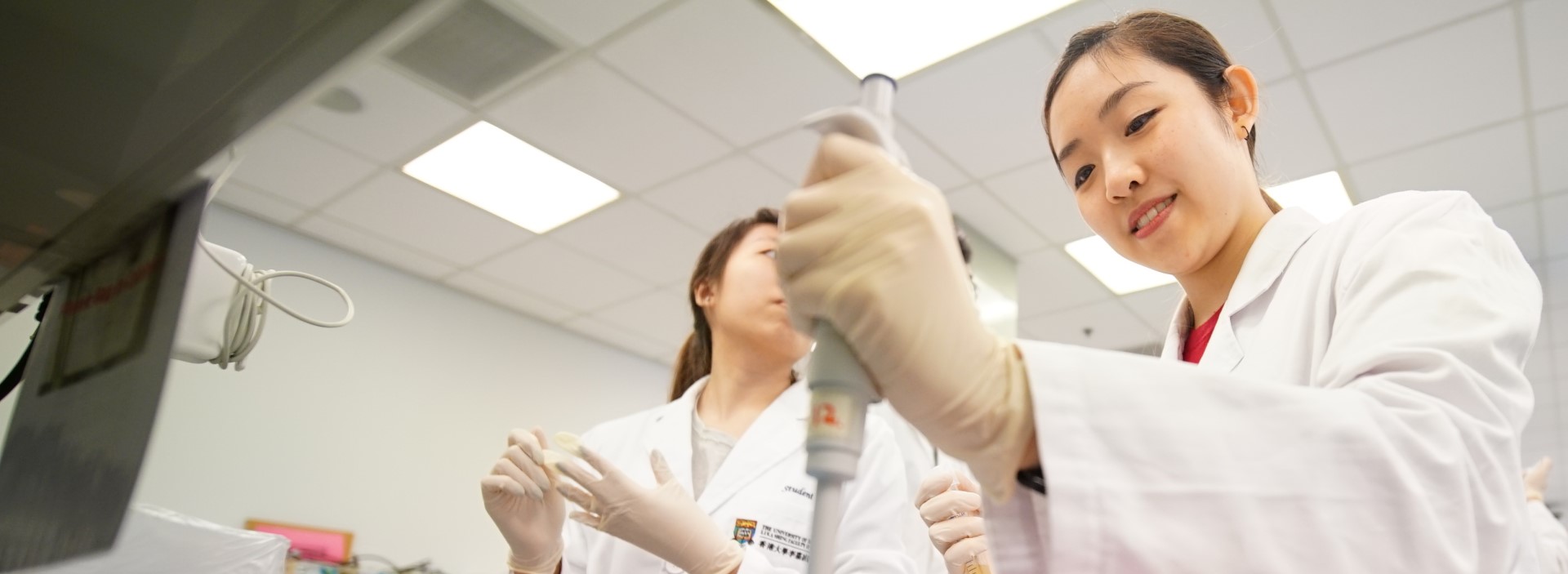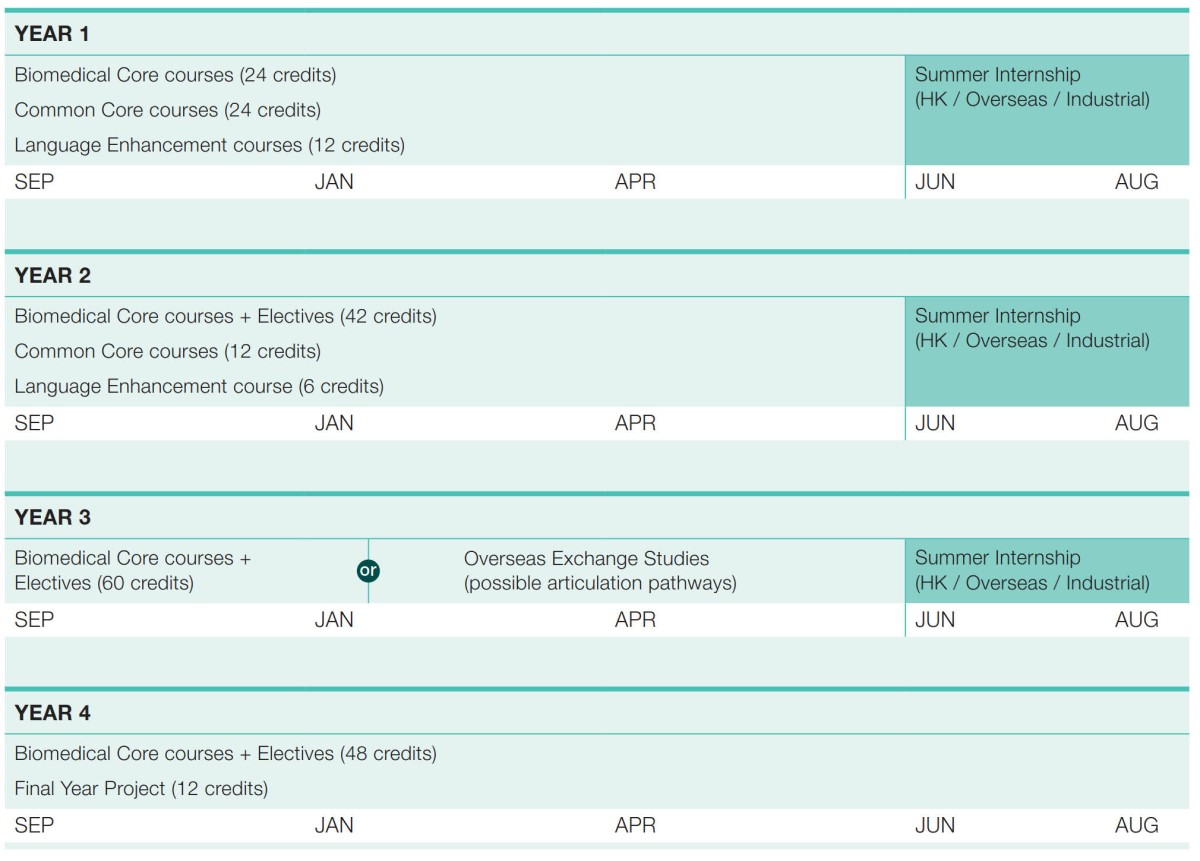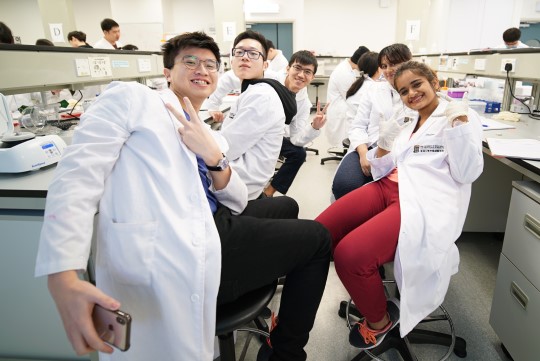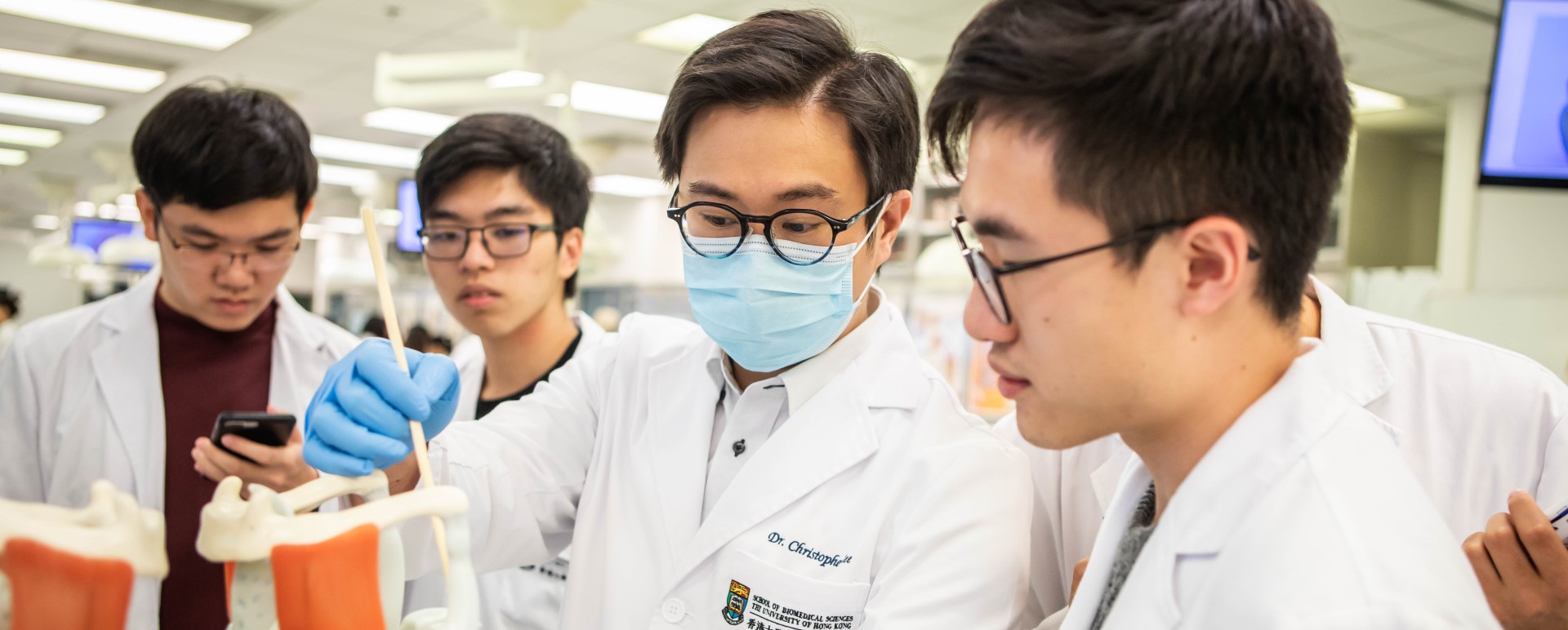
Bachelor of Biomedical Sciences(BBiomedSc)
Programme Aims and Themes
Biomedical sciences cover a wide range of scientific and allied disciplines, including molecular and cell biology, genetics and genome science, bioinformatics, anatomy, physiology, pharmacology, biological and medicinal chemistry, immunology and microbiology, and public and environmental health. The study of biomedical sciences focuses on the relationships between humans, health, and disease, translating biomedical applications of basic sciences to the clinical practices of health services and healthcare industry.
The 21st century is widely regarded as an age of ‘biomedicine’. With the backup of its excellent track record in biomedical research and a strong team of biomedical scientists, the Faculty offers the Bachelor of Biomedical Sciences (BBiomedSc) programme with the aim of nurturing graduates with broad but core knowledge in key biomedical disciplines. They will be well-trained to develop careers in areas such as research in universities, government and medical laboratories; research and development for the pharmaceutical, diagnostics, medical devices and laboratory instrumentation industries, and management and business development of related industries; clinical trials management; media and communication; and health promotion, hospital administration and healthcare planning. They will also have acquired an excellent foundation for articulation to medical, veterinary sciences and other health-related professional programmes through graduate entry, and for MPhil/PhD studies.
Programme Overview
The BBiomedSc curriculum is designed with a good balance of structure and flexibility, allowing students to plan their study straddling sciences and humanities. The focus of the Biomedical Sciences core courses is to cover:
• the structures and functions of the human body and the processes that are essential to life;• the basic principles of the processes, mechanisms, patterns of diseases and concepts of therapeutic strate- gies; and• the essential analytical methodologies and the state of the art of contemporary information technology in the field of biomedical sciences.
Students are required to complete a total of 240 credits of courses in the four-year curriculum, of which 96 credits are Biomedical Sciences major courses, 36 credits are Common Core courses, and 18 credits are Language Enhancement courses. The remaining 90 credits are for minor and electives.
Core Courses for Biomedical Sciences Major
The core courses are divided into introductory and advanced levels.
Introductory Courses
The introductory courses consolidate students’ knowledge of anatomy, human biology, human physiology, biochemistry, and pharmacology which are all necessary to understand the basis of human biology and processes that are essential to life. Students are required to complete the following introductory courses:
• Human Biology• Perspectives in Biochemistry• Biostatistics• General Chemistry I / Foundations of Chemistry• Basic Biomedical Laboratory Techniques
Plus any four of the following:
• Introduction to Human Anatomy• Biomedical Pharmacology• Physiological Basis of Health and Disease• Introduction to Clinical Research• Exercise Physiology• Human Genetics• Fundamentals of Clinical Trial Management• Physical and Health Benefits of Exercise• Research Methods in Medicine and Health
Advanced Courses
The advanced courses provide students with a foundation in the cellular, molecular and genetic basis of human diseases, as well as strategies for diagnosis. In the last year of study, students are required to undertake a final year project. The Final Year Project constitutes a capstone experience for students, allowing them to integrate their knowledge and apply experimental and informatics skills to solve defined problems by research.
Students are required to complete the following advanced courses:
• Molecular Diagnostics Laboratory• Final Year Project
Plus any four of the following:
• Medical Microbiology• Molecular Biology of the Cell• Mechanisms and Pathology of Diseases• Infection and Immunity• Biomechanics and Biomedical Technologies• Sequence Bioinformatics• Biopharmaceutical Research and Development• Advanced Exercise Physiology• Rehabilitation Science• Emerging Infectious• Molecular Neuroscience• Biological Basis of Exercise and Health• Exercise and Chronic Disease
Minor Options And Electives
Students can plan their study with the remaining 90 credits in various manners. They may opt to take a minor and/or electives off ered within the BBiomedSc curriculum or off ered in other curricula. The minor options off ered in the BBiomedSc curriculum include:
Minor in Biotechnology & Clinical Research
Example courses:
• Contemporary Topics in Biomedical Technology• Stem Cell Biotechnologies in Regenerative Medicine• Biotechnology industry and entrepreneurship
Minor in Genetics & Genomics
Example courses:
• Cancer Biology• Genome Science• Public Health Genetics
Minor in Kinesiology
Example courses:
• Exercise Physiology• Advanced Exercise Physiology• Physical and Health Benefits of Exercise
There are also elective courses offered under the curriculum:
• Advanced Physiological Science• Biomedical Innovation Team Project
Modes of Learning
Students will be exposed to a wide range of learning experiences, varying with courses they are enrolled in. These experiences include traditional lectures, laboratory practicals, problem-based learning tutorials, web-based learning as well as research projects.
Research and Summer Internship Opportunities
BBiomedSc students are provided with ample opportunities to experience laboratory-based research and be trained for a career in research and development. Under the Summer Research Internship Programme, they can join the research teams of professoriate members of the Faculty, attach to the research laboratories of top class universities abroad, and work in an external agency related to field of Biomedical Sciences or in other industries in the summer of Year 1, 2 and 3. The Undergraduate Research Fellowship Programme (URFP) of the University supports students in their pursuit of research and development with the provision of scholarships.

Possible Articulation Pathways

Enquiries
For further enquires on the admissions process and the curriculum for the Bachelor of Biomedical Sciences:
Email: sbms@hku.hkWebsite: http://www.sbms.hku.hkPhone: (852) 3917 9259
For more on the Bachelor of Biomedical Sciences programme visit: http://www.sbms.hku.hk/education/undergraduate-education/bachelor-of-biomedical-sciences/introduction


